Midway through the Sprin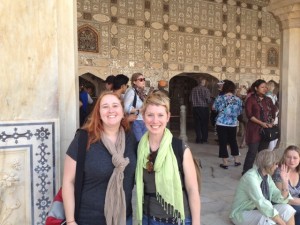 g semester of 2013, Leslie Dorrough Smith (on the right of the photo) accompanied a group of undergraduate students from Avila University to a variety of cities in India, including Delhi, Agra, and Jaipur. The study abroad course in which the students were enrolled focused on issues of social justice. Read a post by Leslie here, discussing how, when some people (e.g., North Americans) travel to such locales, they report witnessing exploitation all around (such as the women Leslie reports who would let tourists hold their children for a picture–but for a fee). “We only see it as exploitation,” Leslie concludes, “because we have the luxury of doing so, to put it simply.”
g semester of 2013, Leslie Dorrough Smith (on the right of the photo) accompanied a group of undergraduate students from Avila University to a variety of cities in India, including Delhi, Agra, and Jaipur. The study abroad course in which the students were enrolled focused on issues of social justice. Read a post by Leslie here, discussing how, when some people (e.g., North Americans) travel to such locales, they report witnessing exploitation all around (such as the women Leslie reports who would let tourists hold their children for a picture–but for a fee). “We only see it as exploitation,” Leslie concludes, “because we have the luxury of doing so, to put it simply.”
Holey Frescoes
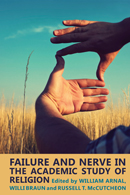 Vaia Touna recently published a chapter in Failure and Nerve in the Academic Study of Religion, entitled “Redescribing Iconoclasm: Holey Frescoes and Identity Formation.” The chapter focuses on a small Greek Orthodox church in the upper old city of Thessaloniki,Greece, and the differing local ways in which its damaged interior icons are made meaningful and understood by both its members and the scholars who have restored them.
Vaia Touna recently published a chapter in Failure and Nerve in the Academic Study of Religion, entitled “Redescribing Iconoclasm: Holey Frescoes and Identity Formation.” The chapter focuses on a small Greek Orthodox church in the upper old city of Thessaloniki,Greece, and the differing local ways in which its damaged interior icons are made meaningful and understood by both its members and the scholars who have restored them.
Religious Experience
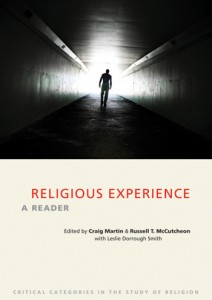 Craig Martin and Russell McCutcheon recently co-edited an anthology on religious experience for Acumen Publishing of the UK–or better put, a collection of critical readings that takes the discourse on religious experience as its object of study, inasmuch as all scholars have to study are claims of experience, regardless the sort. And Leslie Dorrough Smith contributed the critical introductions to each reading.
Craig Martin and Russell McCutcheon recently co-edited an anthology on religious experience for Acumen Publishing of the UK–or better put, a collection of critical readings that takes the discourse on religious experience as its object of study, inasmuch as all scholars have to study are claims of experience, regardless the sort. And Leslie Dorrough Smith contributed the critical introductions to each reading.
Changing the Subject
Merinda Simmons‘s first monograph, Changing the Subject: Writing Women across the African Diaspora, has just been contracted by Ohio State University Press. A critique of the scholarly emphasis on authenticity in literary and postcolonial theory, it offers a counterpoint with readings of several African diasporic texts that demonstrate the contingent and contextual frameworks within which categories like “identity” and “voice” are thought to emerge, demonstrating that, instead of being stable, subjects and subjectivities change as they move from place to place.
A Critical Question
Over at the blog for the Bulletin for the Study of Religion, Merinda Simmons has been among those invited to respond to their query about the line–if any–between scholarship and politics.
It’s Time to Be Honest With Lauryn Hill
Culture on the Edge participant, Monica Miller, recently posted a blog, “It’s Time to Be Honest With Lauryn Hill,” that concludes:
“Over the years, Hill’s lyrical lessons have jolted many from societal slumber and historical amnesia enough to make her a tour de force of the ‘conscious’ hip hop market. But Hill’s troubling portraits of lifestyles not her own are as problematic as the racism and capitalist systems she’s fought for so many years. As she tries to “…figure out how to pay her own tax debts,” may she also realize the expense imposed by her “existential catharsis” on LGBTQ individuals as they continue to fight for justice for their lives and partnerships. As we love to love Hill, let’s love her enough to be honest with her: Enough with responding to one social injustice by perpetuating another. You’re a better MC than that!”
To which Hill responded.
Touna Presents at Canadian Conferences
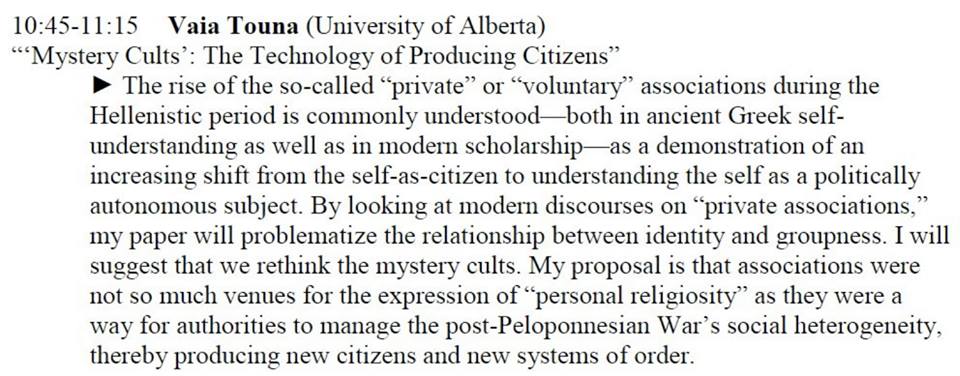 In early June 2013, Culture on the Edge’s Vaia Touna presented her research at the Canadian Society for the Study of Religion‘s annual meeting, as well as at the Canadian Society of Biblical Studies–both held in Victoria, BC. The papers–one rethinking the common modern reading of Euripides’s “Hippolytos” as an expression of individualism and the other redescribing the notion of ancient mystery cults, seeing them not as sites for expressing religious experience (as they are usually described by scholars) but as places where marginal members of the city-state were integrated.
In early June 2013, Culture on the Edge’s Vaia Touna presented her research at the Canadian Society for the Study of Religion‘s annual meeting, as well as at the Canadian Society of Biblical Studies–both held in Victoria, BC. The papers–one rethinking the common modern reading of Euripides’s “Hippolytos” as an expression of individualism and the other redescribing the notion of ancient mystery cults, seeing them not as sites for expressing religious experience (as they are usually described by scholars) but as places where marginal members of the city-state were integrated.
Regional AAR President
 For 2012-3, Culture on the Edge’s Steven Ramey was President of the Southeastern Region of the American Academy of Religion (part of the Southeast Commission on the Study of Religion, or SECSOR). Visit our blog, Claims, to watch his Presidential Address.
For 2012-3, Culture on the Edge’s Steven Ramey was President of the Southeastern Region of the American Academy of Religion (part of the Southeast Commission on the Study of Religion, or SECSOR). Visit our blog, Claims, to watch his Presidential Address.
New Books in Religion: Religion and Hip Hop
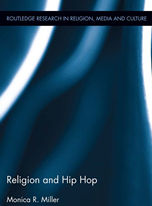 Check out an online interview posted at New Books in Religion with Culture on the Edge’s Monica Miller, about her recent book, Religion and Hip Hop (Routledge, 2012). “She does not perform a theological or religious analysis of music or lyrics as a search for meaning but rather examines the material productions of Hip Hop culture and the manufactured zones of significance within various discourses.”
Check out an online interview posted at New Books in Religion with Culture on the Edge’s Monica Miller, about her recent book, Religion and Hip Hop (Routledge, 2012). “She does not perform a theological or religious analysis of music or lyrics as a search for meaning but rather examines the material productions of Hip Hop culture and the manufactured zones of significance within various discourses.”
The Sacred is the Profane
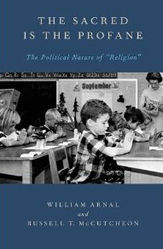 Russell McCutcheon, along with his co-author William Arnal, just published a collection of essays entitled The Sacred is the Profane: The Political Nature of “Religion” with Oxford University Press. The book presses forward the thesis that the category “religion” is one of our own group’s ways of classifying, sorting, and thereby understanding the world around us rather than, as is most often thought, being a natural and thus permanent feature of that world.
Russell McCutcheon, along with his co-author William Arnal, just published a collection of essays entitled The Sacred is the Profane: The Political Nature of “Religion” with Oxford University Press. The book presses forward the thesis that the category “religion” is one of our own group’s ways of classifying, sorting, and thereby understanding the world around us rather than, as is most often thought, being a natural and thus permanent feature of that world.
